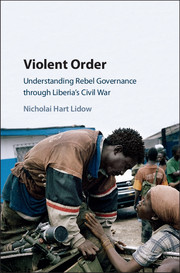Appendix A - Fieldwork in Liberia
Published online by Cambridge University Press: 12 October 2016
Summary
This appendix provides additional information on the research that I conducted in Liberia, including my background in the country, randomized fieldwork in villages, and interviews with key actors in the conflict. My first experiences in Liberia were guided by a group of Liberian friends, some of whom were recently returned exiles while others had remained in Liberia throughout the war. This social network provided a unique insight and access into Liberian society and politics. Their perspectives differed significantly from the opinions that I heard from expatriate aid workers, as well as the international media's portrayal of the Liberian war. By following their lead, I learned how to abide by cultural norms,whether I was interviewing a village elder or just asking directions from a passer by. Perhaps more importantly, their street-smarts and family networks taught me how to locate key informants in a country that was still finding its footing after fourteen years of war.
In addition to my group of friends, I developed a wider network while conducting surveys for NGOs, covering the 2005 elections as a freelance journalist, and managing research projects for my advisors. I also made a documentary film, Sliding Liberia. These assignments allowed me to travel widely, visiting places and speaking with people that I would not have encountered within the narrow confines of the research question. At one point I spent two weeks traveling on foot through the most remote corners of Lofa County to implement a series of behavioral experiments. Far from the nearest road, these villages provided insight into how civilians survived during the war, as well as the complicated logistics required to transport supplies, ammunition, and soldiers to the front lines.
The first phase of research for this project began in mid-2007 and focused on understanding the conflict economy of Liberia. The goal was to collect detailed information on how civilians and rebels maintained access to food during the war, how rebels taxed and/or looted from civilians, and how this behavior varied across the country. The unit of analysis was the village or town, and I interviewed elders, market sellers, farmers, and local combatants to understand the local histories in each location.
- Type
- Chapter
- Information
- Violent OrderUnderstanding Rebel Governance through Liberia's Civil War, pp. 241 - 247Publisher: Cambridge University PressPrint publication year: 2016



